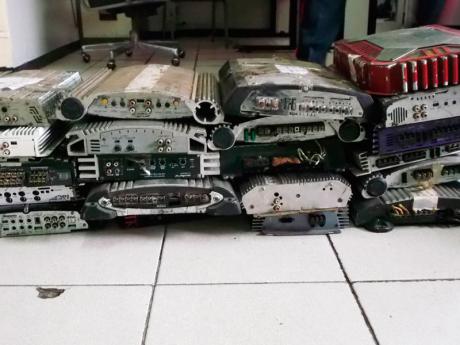Driving towards deafness - Powerful car stereos endanger hearing
Sheldon Williams, Gleaner Writer
Prolonged exposure to music at high volumes from vehicle stereos will inevitably put consistent listeners' hearing at risk and can lead to permanent noise-induced hearing loss.
Certified audiologist and head of audiological services at the Jamaica Association for the Deaf, LaToya Wilmot-Brown, explained that "noise-induced hearing loss is of great concern, and with an increasing trend of personal stereo systems, we will see an increase in younger persons with this kind of hearing loss unless we all learn to listen safely".
The level of noise which she describes as dangerous is much lower than that which can be produced by powerful car stereos.
She explained that "the noise affects the ear cells in the inner ear, which do not regenerate once destroyed. The high frequencies are usually the first to go. Certain consonant sounds such as 's', 'th', and 'f' can become indistinct and this can be noticed as a difficulty making out what people say, although the voices may be audible".
Wilmot-Brown told Automotives that the damage will not be discerned immediately, but increases gradually as persons maintain exposure to loud music. She reasoned that any noise that exceeds 85 (Db) is unsafe.
"To give this some perspective, hair dryers, blenders and vacuum operate at about 90dB. MP3 players at full volume are about 100dB. Some car stereos go up to even 140dB at full volume. Music can be harmful if it is too loud and lasts too long; for example, listening for six hours to your mp3 player at full volume, or very loud but for a short time, such as two minutes standing next to the speaker at a party."
Chantall Hardy, general manager at Sound City, a dealer in stereos and alarms, explained that the company specialises in providing tailored music set-ups for automobiles. She said the company's most devoted clientele are private-car owners and corporate companies. She explained that hi-phonic amplifiers, kicker speakers and Nat amplifiers are popular choices for customers.
"What we see as a trend on the rise is corporate companies that are purchasing private vehicles and
pimping them out," Hardy explained.
However, she admitted that the company does not sensitise customers about the extreme output of the sound equipment, as they are usually fully aware of the potential of the gadgets they ask for. "On a regular business day, we will get one to five requests, but during the Christmas period we will get 20 to 25," Hardy said.
In a Letter to the Editor where in February 2006, one person expressed their anger and frustration at the volume of music being played close to their home on car stereos. L Duperrouzel said:
NEW
PROBLEM
"I used to write bitter and pleading letters
to you about the terrible noise nuisance coming from the planned
entertainment at Devon House. Now that that has considerably toned down,
thanks to the police response to mine and others' complaints, there is
another problem which is even worse.
There is
absolutely no control over the people who come to Devon House playing
their car stereos at the highest possible volume (not to mention the
obscene content of the songs played) at any hour of night or
day.
The parking lot has become a competition party
area for these 'patrons' to blast their beastly noise and create a
pounding, disgusting assault upon the senses and lives of people living
nearby (which I and my family unfortunately do). These blasting car
stereos inevitably set off all the car alarms on parked vehicles around
them, which then continue to alarm and alarm in a maddening chorus,
without ceasing until the battery runs out or someone comes along and
turns it off."
In addition to the implications for
hearing loss, there are also legal issues with the volume of music being
played on motor-vehicle stereos. Senior Superintendent Radcliffe Lewis,
head of The Jamaica Constabulary Force Traffic Divison, told
Automotives that operators of public passenger
vehicles (PPV) can be charged for playing loud music, but hinted that
the law does not speak to operators of private vehicles. He advised that
PPV operators could be charged with breach of the Noise Abatement Act
and playing music on PPV. He said the practice is so prevalent that a
number of persons have been charged for the
offences.
"All the while people get charged. It's
something they know, and they know when to play the music because they
have a target audience. So it's when special people are in the bus, like
schoolchildren," Lewis said. However, Lewis said that many times,
passengers on the PPV vehicles will call the police and give the
location of the vehicle so they can intercept it.
"You
have persons who call us from time to time and tell us that loud music
is being played and the conductor and driver will think they are a part
of the audience," Lewis said.
Wilmot-Brown gave
general warning signs of potential hearing damage. "When listening to
music through headphones, a rule of thumb is that if your neighbour can
hear what you are listening to, it is too loud. If you have to shout
over the music in order to carry on a conversation, then the music is
too loud. If the music is painful to your ears, or makes your ears ring,
then it is too loud. If you have decreased or muffled hearing for a few
hours after exposure, then the music was too loud. These guidelines go
for other types of noise as well, such as noise at the workplace
(traffic, industrial noise), and noises within the home (appliances),"
she
said.

